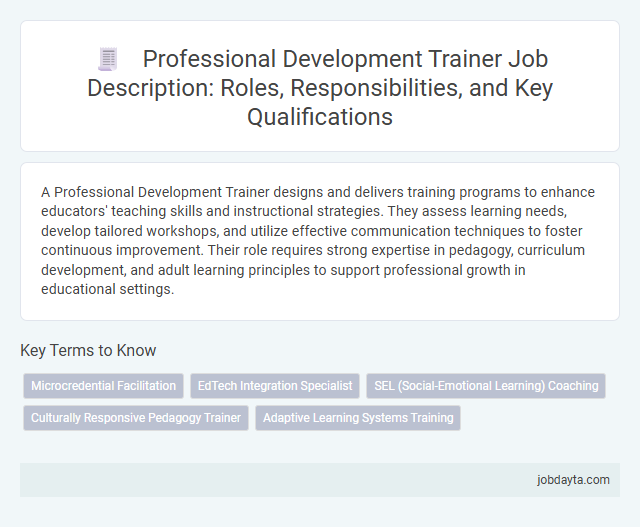A Professional Development Trainer designs and delivers training programs to enhance educators' teaching skills and instructional strategies. They assess learning needs, develop tailored workshops, and utilize effective communication techniques to foster continuous improvement. Their role requires strong expertise in pedagogy, curriculum development, and adult learning principles to support professional growth in educational settings.
Overview of a Professional Development Trainer Role
A Professional Development Trainer plays a critical role in enhancing workforce skills and knowledge. This position focuses on designing, delivering, and evaluating effective training programs.
- Training Program Design - Develops customized learning modules tailored to organizational needs and individual skill gaps.
- Instruction and Facilitation - Leads engaging workshops and seminars that promote active learning and professional growth.
- Performance Evaluation - Assesses training outcomes using feedback and metrics to ensure continuous improvement and goal achievement.
Key Responsibilities of a Professional Development Trainer
| Key Responsibilities of a Professional Development Trainer |
|---|
Your role as a Professional Development Trainer is essential in fostering continuous growth and elevating workforce capabilities. |
Essential Skills and Qualifications Required
Professional Development Trainers play a critical role in enhancing employee skills and organizational growth. They design and deliver training programs tailored to industry needs and individual learning styles.
Key qualifications include a strong background in adult education, effective communication, and expertise in the relevant professional domain. Essential skills encompass instructional design, leadership, and the ability to assess training effectiveness for continuous improvement.
Designing Effective Training Programs
Professional development trainers specialize in creating training programs that enhance employee skills and organizational performance. Designing effective training programs involves assessing learner needs, developing targeted content, and utilizing interactive delivery methods. Your success depends on well-structured sessions that engage participants and promote practical learning outcomes.
Facilitating Adult Learning and Engagement
What makes a Professional Development Trainer effective in facilitating adult learning and engagement? Skilled trainers apply evidence-based strategies tailored to adult learners' needs, promoting active participation and critical thinking. They create inclusive environments that encourage collaboration and continuous feedback.
Evaluating Training Outcomes and Impact
Evaluating training outcomes is essential for measuring the effectiveness of professional development programs. Assessing impact helps refine future training strategies and enhances learner performance.
- Learning Assessment - Conduct quantitative and qualitative evaluations to determine knowledge retention and skill improvement.
- Behavioral Change Analysis - Monitor changes in workplace behavior to link training directly with improved job performance.
- Return on Investment (ROI) - Calculate financial and operational benefits to justify the training program's value and inform resource allocation.
Collaboration with Educational Institutions and Staff
Professional Development Trainers play a crucial role in enhancing the skills and knowledge of educators through strategic collaboration with educational institutions and staff. These trainers facilitate continuous learning environments that promote instructional excellence and student success.
- Partnership with Schools - Establish relationships with schools to tailor professional development programs that meet specific institutional needs.
- Staff Engagement - Collaborate directly with teachers and administrative staff to identify skill gaps and foster a culture of growth and innovation.
- Curriculum Integration - Work alongside curriculum developers to align training content with current educational standards and practices.
Effective collaboration between professional development trainers and educational institutions leads to measurable improvements in teaching quality and student outcomes.
Utilizing Technology in Professional Development
Professional Development Trainers specializing in utilizing technology enhance educational outcomes by integrating digital tools into training programs. They empower educators to leverage innovative platforms for effective teaching and continuous learning.
These trainers design tailored workshops that incorporate online collaboration tools, learning management systems, and multimedia resources to improve instructional skills. By promoting the use of technology, they foster interactive and engaging professional development experiences. Their approach ensures that educators remain current with technological advancements and best practices in education.
Career Growth and Advancement Opportunities
Professional development trainers specialize in enhancing career growth by equipping individuals with essential skills and knowledge. They design tailored programs that target industry-specific competencies and leadership abilities.
These trainers facilitate advancement opportunities through workshops, coaching, and continuous learning strategies. Organizations benefit from improved employee performance and higher retention rates by investing in professional development.
Challenges Faced by Professional Development Trainers
Professional Development Trainers encounter challenges such as tailoring content to diverse learning styles and varying skill levels within a single group. Managing participant engagement while balancing administrative responsibilities demands exceptional organizational skills. Your ability to adapt training methods and address individual needs directly impacts the effectiveness of professional growth initiatives.
Related Important Terms
Microcredential Facilitation
Professional Development Trainers specializing in Microcredential Facilitation design and implement targeted training programs that enable educators to develop specific skill sets recognized through digital badges and certificates. Their expertise ensures seamless integration of microcredential pathways into professional learning frameworks, enhancing educator competency and career advancement opportunities.
EdTech Integration Specialist
A Professional Development Trainer specializing as an EdTech Integration Specialist empowers educators with cutting-edge technology tools and innovative teaching strategies to enhance classroom engagement and improve student outcomes. Expertise in curriculum design, digital resource implementation, and personalized training sessions ensures seamless adoption of educational technology across diverse learning environments.
SEL (Social-Emotional Learning) Coaching
Professional Development Trainers specializing in Social-Emotional Learning (SEL) Coaching equip educators with evidence-based strategies to enhance students' emotional intelligence and interpersonal skills. Implementing SEL frameworks leads to improved classroom dynamics, increased student engagement, and measurable growth in academic and social outcomes.
Culturally Responsive Pedagogy Trainer
A Professional Development Trainer specializing in Culturally Responsive Pedagogy empowers educators to create inclusive learning environments that respect diverse cultural backgrounds and promote equitable student engagement. This training enhances teachers' skills in understanding cultural influences on learning styles, fostering empathy, and implementing strategies that address educational disparities effectively.
Adaptive Learning Systems Training
Professional Development Trainers specializing in Adaptive Learning Systems Training empower educators to customize instructional methods using real-time data, enhancing learner engagement and retention. These trainers integrate AI-driven technologies and evidence-based strategies to optimize personalized learning pathways in diverse educational settings.
Professional Development Trainer Infographic

 jobdayta.com
jobdayta.com